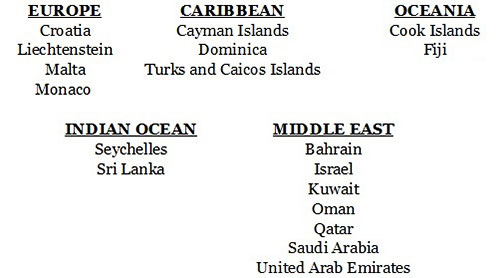|
Of particular interest is the following condition:
Interesting....
After all, cash and
precious metals are traditional primary stores of wealth. Why single
them out as no longer being acceptable?
In this effort, they're being assisted
by many of the world's governments, which are rapidly increasing the
level of legislation that controls what individuals are allowed to
do with their own wealth.
Again, these will be implemented by the
banks. But in order to maximize the amount that will be taken, it
will be necessary to force people out of other forms of wealth
storage and into bank deposits.
To do so would glaringly expose the banks as plunderers (assuming the theft of deposits had not already achieved that end).
Since the holders would understandably
prefer not to take the cash home and stuff it in their mattresses,
they would be encouraged to deposit it, where it would be exposed to
confiscation.
Also not a good item to have lying
around the house. Bank clients might come to the conclusion that it
was time to cash in the "barbarous relic" and deposit the proceeds.
When this has been perceived by them to
have been achieved to the optimum degree, it will be time to spring
the confiscation trap.
In my belief, confiscation will take
place worldwide and without warning. One Monday morning, depositors
will wake up to the realization that, over the weekend, confiscation
had taken place and their deposits had been raided.
Further,
the IMF has recently run another
confiscatory idea up the flagpole - an across-the-board
percentage-based confiscation on all deposits. At this point, there
can be no certainty as to how many different confiscations will
occur, let alone what the total rape of deposits will be.
Wealth storage in safe deposit boxes looks to become a thing of the past.
At this point, it would be wise to
retain only three months expense-money in any bank, and even that
amount should be regarded as sacrificial.
Considering the fragility of the bond
and stock markets and the concurrent fragility of hedge funds and
retirement funds, the most viable choices are precious metals, land,
and built property. And these are truly safe only if they are
located in jurisdictions that have no confiscatory laws.
However, there are, for example, only few countries in the Western Hemisphere that have no property tax of any kind:
(Even a small
property tax allows a government to claim that the tax has not been
paid, so the property may be taken.)
Any top-rated facility, with a Class III
vault can potentially fill the bill, but again, the key is to select
one that's located in a jurisdiction where there's a history of
stable, non-intrusive government, where no confiscatory laws exist,
and where there's no taxation or regulation of any kind on either
the purchase, ownership, transportation, or storage of precious
metals, or the profit generated by a sale. The elimination of safe deposit box storage of cash and precious metals is a further bellwether that the noose is tightening on the ability to store wealth.
However, precious metals are the one form of money that is not also the liability of any government and is therefore difficult for governments to control, let alone demand its repatriation.
Likewise, a portfolio of land and built
property in a non-intrusive, no-tax jurisdiction cannot be
confiscated by foreign governments, except as an act of war. As
such, these two safe havens of wealth will continue, as they have
for over 5,000 years, in spite of the efforts of rapacious
governments.
There will be no signs on banks advertising,
Those who escape the loss of wealth will
be those who have removed it in advance of any confiscation and
converted it into a safer form,
in a safer jurisdiction.
|


